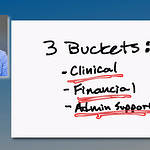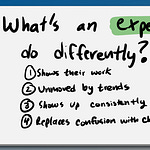It’s Monday morning, and instead of playing catch-up over a deluge of text messages and trying to figure out where to squeeze patients in…our patients were booking their own appointments on Sunday evening (and very early Monday morning!)
Why You Should Turn On Self-Scheduling
I want to talk through really quickly why I firmly believe that you should turn on self-scheduling for your patients.
I know there are a lot of people out there—especially in primary care, specialty care, micro practices, and solo practices—who think, “My patients will just mess it up.” I’ve heard that. I’ve sat around tables where people have said it.
But here’s the thing: there are a couple of reasons why I think you should consider self-scheduling, despite the bias that people will mess it up.
Real Examples From Just One Day
Here are some bookings from yesterday (Sunday):
8:37 p.m. appointment – A parent was worried about possible hand, foot, and mouth disease. Instead of calling or going to urgent care, they booked online. This gave them peace of mind, knowing something was on the books. The next day, we could follow up: “Can you send some pictures? Maybe we can save you the visit.” Either way, they slept easier knowing they had an appointment.
2:39 a.m. appointment – Another parent was up in the middle of the night worried about their child. Instead of going to the ER or remembering to call in the morning, they booked online. Later, they even rescheduled for an earlier time—all without us intervening.
6:36 a.m. appointment – Yet another family with three young kids booked early in the morning without disrupting our routines or forcing a game of phone tag.
What This Tells Me
Your patients are able to do it. These weren’t random or frivolous bookings. They were all legit acute needs.
We also get many well checks booked late at night—11 p.m., for example. A parent remembers, instead of writing it on a to-do list and waiting days or weeks, they simply go online, find a time that works, and book it. They mentally check it off, feel good about it, and it saves us all the hassle.
Sure, we could handle these by text or calls the next morning, but by then we’d be playing catch-up. With self-scheduling, everything is already taken care of.
Why Self-Scheduling Matters
If you haven’t turned on self-scheduling, I want you to ask yourself: what’s stopping you?
Especially if you have a small practice or a small team:
Self-scheduling saves you endless back-and-forth.
It eliminates a ton of unnecessary notifications.
It gives patients peace of mind.
After more than four years of self-scheduling, I honestly can’t think of a time where a patient misused it. Sometimes we’ll follow up and say, “Hey, you may not actually need to come in, here’s what we think is going on.” But patients are never upset about that. In fact, they see it as a value add, not a subtraction.
So my encouragement is simple: turn on self-scheduling.
You need it, and your patients will love it too.
Lastly! This Wednesday starts the 3 day direct pediatric care summit! It’s virtual so you can join without sneaking away from work!
If you haven’t registered yet you still can! We have over a dozen speakers talking about all things pediatrics & direct care, including Dr Paul Offit on how to talk about vaccines with parents these days! Recordings are available if you’re busy and can’t make each talk!









